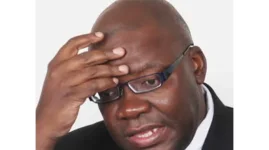The Supreme Court tossed out Harare lawyer Tendai Biti's appeal, keeping in place the High Court's earlier decision. This means Biti can't get more time in a million-dollar defamation case brought against him by Augur Investments executives.
Kenneth Sharpe wants $400,000 because Biti allegedly called him one of Zimbabwe's most corrupt people stealing national resources. Augur Investments asks for $500,000, and their operations chief, Tatiana Aleshina, demands $100,000 for damages. The case moved forward after judges entered a default judgment against Biti, which he tried to fight by taking it to the Supreme Court.
All Supreme Court judges agreed to reject his appeal because it lacked merit. Justice Felistus Chatukuta wrote that the lower court carefully considered key requirements for giving Biti more time. She pointed out that his three-month delay filing paperwork seemed excessive, and he never properly explained why he was late.
The judges, including Deputy Chief Justice Elizabeth Gwaunza and Justice Chinembiri Bhunu, decided Biti had almost no chance of winning his appeal. They referred to Justice Manzunzu's previous ruling that denied Biti permission to appeal the default judgment. The High Court felt the process needed to end for everyone's benefit.
Justice Chatukuta dismissed claims that the High Court missed important factors or failed to explain its decision clearly. She noted that Biti's appeal actually acknowledged the lower court's reasoning but never successfully challenged it—a mistake that doomed his case. The court ruled that Biti showed no reason to reverse the High Court's decision.
The original dispute involved Biti trying to cancel a judgment against him. However, Justice Chatukuta explained that once his request for more time was denied, the judgment became final. As a completed judgment, Biti could appeal it directly without special permission.
Justice Chatukuta examined all three parts of Biti's appeal and found none had substance. She emphasized the lower court properly applied legal principles and clearly explained its decision. Last year, High Court Justice Gladys Mhuri rejected Biti's excuse for filing late paperwork, calling his delay unreasonable.
Justice Mhuri pointed out that default judgments usually can't be appealed - something an experienced lawyer like Biti should have known. The case appears headed for trial since Biti has exhausted his appeals to stop the defamation suit from proceeding against him.
Kenneth Sharpe wants $400,000 because Biti allegedly called him one of Zimbabwe's most corrupt people stealing national resources. Augur Investments asks for $500,000, and their operations chief, Tatiana Aleshina, demands $100,000 for damages. The case moved forward after judges entered a default judgment against Biti, which he tried to fight by taking it to the Supreme Court.
All Supreme Court judges agreed to reject his appeal because it lacked merit. Justice Felistus Chatukuta wrote that the lower court carefully considered key requirements for giving Biti more time. She pointed out that his three-month delay filing paperwork seemed excessive, and he never properly explained why he was late.
The judges, including Deputy Chief Justice Elizabeth Gwaunza and Justice Chinembiri Bhunu, decided Biti had almost no chance of winning his appeal. They referred to Justice Manzunzu's previous ruling that denied Biti permission to appeal the default judgment. The High Court felt the process needed to end for everyone's benefit.
Justice Chatukuta dismissed claims that the High Court missed important factors or failed to explain its decision clearly. She noted that Biti's appeal actually acknowledged the lower court's reasoning but never successfully challenged it—a mistake that doomed his case. The court ruled that Biti showed no reason to reverse the High Court's decision.
The original dispute involved Biti trying to cancel a judgment against him. However, Justice Chatukuta explained that once his request for more time was denied, the judgment became final. As a completed judgment, Biti could appeal it directly without special permission.
Justice Chatukuta examined all three parts of Biti's appeal and found none had substance. She emphasized the lower court properly applied legal principles and clearly explained its decision. Last year, High Court Justice Gladys Mhuri rejected Biti's excuse for filing late paperwork, calling his delay unreasonable.
Justice Mhuri pointed out that default judgments usually can't be appealed - something an experienced lawyer like Biti should have known. The case appears headed for trial since Biti has exhausted his appeals to stop the defamation suit from proceeding against him.












